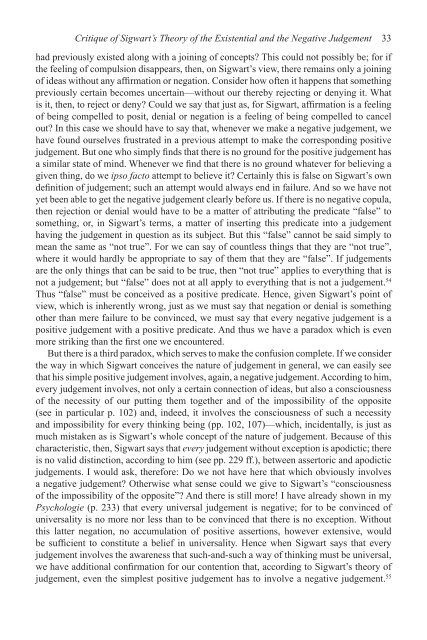Franz Brentano_The True and the Evident.pdf
Franz Brentano_The True and the Evident.pdf
Franz Brentano_The True and the Evident.pdf
You also want an ePaper? Increase the reach of your titles
YUMPU automatically turns print PDFs into web optimized ePapers that Google loves.
Critique of Sigwart’s <strong>The</strong>ory of <strong>the</strong> Existential <strong>and</strong> <strong>the</strong> Negative Judgement 33<br />
had previously existed along with a joining of concepts? This could not possibly be; for if<br />
<strong>the</strong> feeling of compulsion disappears, <strong>the</strong>n, on Sigwart’s view, <strong>the</strong>re remains only a joining<br />
of ideas without any affirmation or negation. Consider how often it happens that something<br />
previously certain becomes uncertain—without our <strong>the</strong>reby rejecting or denying it. What<br />
is it, <strong>the</strong>n, to reject or deny? Could we say that just as, for Sigwart, affirmation is a feeling<br />
of being compelled to posit, denial or negation is a feeling of being compelled to cancel<br />
out? In this case we should have to say that, whenever we make a negative judgement, we<br />
have found ourselves frustrated in a previous attempt to make <strong>the</strong> corresponding positive<br />
judgement. But one who simply finds that <strong>the</strong>re is no ground for <strong>the</strong> positive judgement has<br />
a similar state of mind. Whenever we find that <strong>the</strong>re is no ground whatever for believing a<br />
given thing, do we ipso facto attempt to believe it? Certainly this is false on Sigwart’s own<br />
definition of judgement; such an attempt would always end in failure. And so we have not<br />
yet been able to get <strong>the</strong> negative judgement clearly before us. If <strong>the</strong>re is no negative copula,<br />
<strong>the</strong>n rejection or denial would have to be a matter of attributing <strong>the</strong> predicate “false” to<br />
something, or, in Sigwart’s terms, a matter of inserting this predicate into a judgement<br />
having <strong>the</strong> judgement in question as its subject. But this “false” cannot be said simply to<br />
mean <strong>the</strong> same as “not true”. For we can say of countless things that <strong>the</strong>y are “not true”,<br />
where it would hardly be appropriate to say of <strong>the</strong>m that <strong>the</strong>y are “false”. If judgements<br />
are <strong>the</strong> only things that can be said to be true, <strong>the</strong>n “not true” applies to everything that is<br />
not a judgement; but “false” does not at all apply to everything that is not a judgement. 54<br />
Thus “false” must be conceived as a positive predicate. Hence, given Sigwart’s point of<br />
view, which is inherently wrong, just as we must say that negation or denial is something<br />
o<strong>the</strong>r than mere failure to be convinced, we must say that every negative judgement is a<br />
positive judgement with a positive predicate. And thus we have a paradox which is even<br />
more striking than <strong>the</strong> first one we encountered.<br />
But <strong>the</strong>re is a third paradox, which serves to make <strong>the</strong> confusion complete. If we consider<br />
<strong>the</strong> way in which Sigwart conceives <strong>the</strong> nature of judgement in general, we can easily see<br />
that his simple positive judgement involves, again, a negative judgement. According to him,<br />
every judgement involves, not only a certain connection of ideas, but also a consciousness<br />
of <strong>the</strong> necessity of our putting <strong>the</strong>m toge<strong>the</strong>r <strong>and</strong> of <strong>the</strong> impossibility of <strong>the</strong> opposite<br />
(see in particular p. 102) <strong>and</strong>, indeed, it involves <strong>the</strong> consciousness of such a necessity<br />
<strong>and</strong> impossibility for every thinking being (pp. 102, 107)—which, incidentally, is just as<br />
much mistaken as is Sigwart’s whole concept of <strong>the</strong> nature of judgement. Because of this<br />
characteristic, <strong>the</strong>n, Sigwart says that every judgement without exception is apodictic; <strong>the</strong>re<br />
is no valid distinction, according to him (see pp. 229 ff.), between assertoric <strong>and</strong> apodictic<br />
judgements. I would ask, <strong>the</strong>refore: Do we not have here that which obviously involves<br />
a negative judgement? O<strong>the</strong>rwise what sense could we give to Sigwart’s “consciousness<br />
of <strong>the</strong> impossibility of <strong>the</strong> opposite”? And <strong>the</strong>re is still more! I have already shown in my<br />
Psychologie (p. 233) that every universal judgement is negative; for to be convinced of<br />
universality is no more nor less than to be convinced that <strong>the</strong>re is no exception. Without<br />
this latter negation, no accumulation of positive assertions, however extensive, would<br />
be sufficient to constitute a belief in universality. Hence when Sigwart says that every<br />
judgement involves <strong>the</strong> awareness that such-<strong>and</strong>-such a way of thinking must be universal,<br />
we have additional confirmation for our contention that, according to Sigwart’s <strong>the</strong>ory of<br />
judgement, even <strong>the</strong> simplest positive judgement has to involve a negative judgement. 55
















